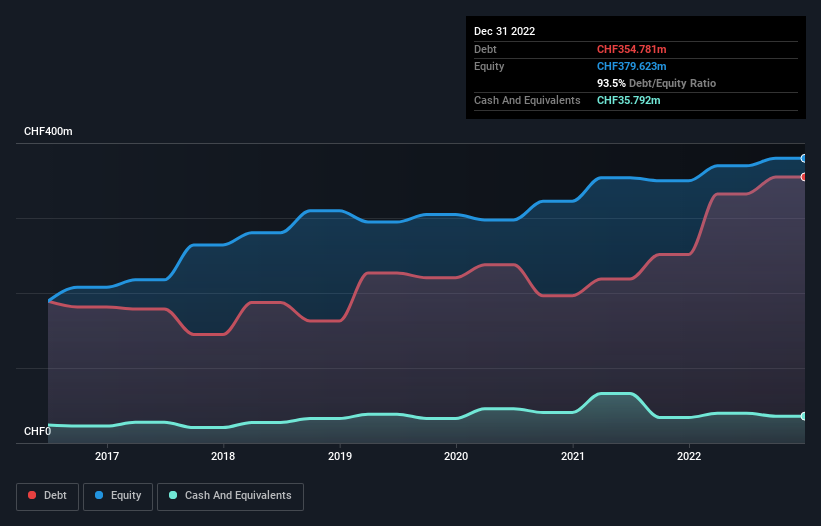
Warren Buffett famously said, 'Volatility is far from synonymous with risk.' So it might be obvious that you need to consider debt, when you think about how risky any given stock is, because too much debt can sink a company. As with many other companies Bossard Holding AG (VTX:BOSN) makes use of debt. But the real question is whether this debt is making the company risky.
When Is Debt A Problem?
Debt assists a business until the business has trouble paying it off, either with new capital or with free cash flow. If things get really bad, the lenders can take control of the business. However, a more usual (but still expensive) situation is where a company must dilute shareholders at a cheap share price simply to get debt under control. Having said that, the most common situation is where a company manages its debt reasonably well - and to its own advantage. The first thing to do when considering how much debt a business uses is to look at its cash and debt together.
See our latest analysis for Bossard Holding
What Is Bossard Holding's Debt?
You can click the graphic below for the historical numbers, but it shows that as of December 2022 Bossard Holding had CHF354.8m of debt, an increase on CHF251.3m, over one year. On the flip side, it has CHF35.8m in cash leading to net debt of about CHF319.0m.

A Look At Bossard Holding's Liabilities
The latest balance sheet data shows that Bossard Holding had liabilities of CHF280.8m due within a year, and liabilities of CHF249.6m falling due after that. On the other hand, it had cash of CHF35.8m and CHF199.6m worth of receivables due within a year. So its liabilities total CHF295.1m more than the combination of its cash and short-term receivables.
Of course, Bossard Holding has a market capitalization of CHF1.73b, so these liabilities are probably manageable. However, we do think it is worth keeping an eye on its balance sheet strength, as it may change over time.
We use two main ratios to inform us about debt levels relative to earnings. The first is net debt divided by earnings before interest, tax, depreciation, and amortization (EBITDA), while the second is how many times its earnings before interest and tax (EBIT) covers its interest expense (or its interest cover, for short). The advantage of this approach is that we take into account both the absolute quantum of debt (with net debt to EBITDA) and the actual interest expenses associated with that debt (with its interest cover ratio).
We'd say that Bossard Holding's moderate net debt to EBITDA ratio ( being 2.0), indicates prudence when it comes to debt. And its commanding EBIT of 31.8 times its interest expense, implies the debt load is as light as a peacock feather. One way Bossard Holding could vanquish its debt would be if it stops borrowing more but continues to grow EBIT at around 15%, as it did over the last year. The balance sheet is clearly the area to focus on when you are analysing debt. But ultimately the future profitability of the business will decide if Bossard Holding can strengthen its balance sheet over time. So if you're focused on the future you can check out this free report showing analyst profit forecasts.
But our final consideration is also important, because a company cannot pay debt with paper profits; it needs cold hard cash. So the logical step is to look at the proportion of that EBIT that is matched by actual free cash flow. In the last three years, Bossard Holding created free cash flow amounting to 18% of its EBIT, an uninspiring performance. For us, cash conversion that low sparks a little paranoia about is ability to extinguish debt.
Our View
When it comes to the balance sheet, the standout positive for Bossard Holding was the fact that it seems able to cover its interest expense with its EBIT confidently. However, our other observations weren't so heartening. For example, its conversion of EBIT to free cash flow makes us a little nervous about its debt. When we consider all the elements mentioned above, it seems to us that Bossard Holding is managing its debt quite well. Having said that, the load is sufficiently heavy that we would recommend any shareholders keep a close eye on it. The balance sheet is clearly the area to focus on when you are analysing debt. However, not all investment risk resides within the balance sheet - far from it. We've identified 3 warning signs with Bossard Holding (at least 2 which are concerning) , and understanding them should be part of your investment process.
If, after all that, you're more interested in a fast growing company with a rock-solid balance sheet, then check out our list of net cash growth stocks without delay.
Valuation is complex, but we're here to simplify it.
Discover if Bossard Holding might be undervalued or overvalued with our detailed analysis, featuring fair value estimates, potential risks, dividends, insider trades, and its financial condition.
Access Free AnalysisHave feedback on this article? Concerned about the content? Get in touch with us directly. Alternatively, email editorial-team (at) simplywallst.com.
This article by Simply Wall St is general in nature. We provide commentary based on historical data and analyst forecasts only using an unbiased methodology and our articles are not intended to be financial advice. It does not constitute a recommendation to buy or sell any stock, and does not take account of your objectives, or your financial situation. We aim to bring you long-term focused analysis driven by fundamental data. Note that our analysis may not factor in the latest price-sensitive company announcements or qualitative material. Simply Wall St has no position in any stocks mentioned.
About SWX:BOSN
Bossard Holding
Engages in the provision of industrial fastening and assembly solutions in Europe, America, and Asia.
Adequate balance sheet average dividend payer.
Market Insights
Community Narratives



